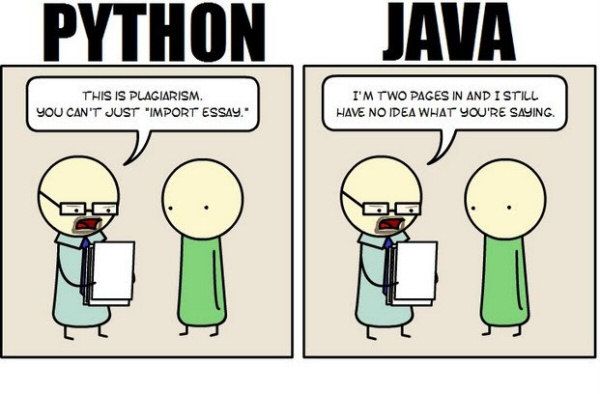1.2. Why Python?¶
Most programmers have a favorite coding language, but there is NOT a single, best choice. Each language does some things very well, other things pretty well, and a few things not so well.
For most tasks, any programming language can do the job. To pick which one to use, think about what each language does best and which languages you enjoy. So why start with Python?
1.2.1. Python Is A Friendly First Language¶
If you start typing “Why learn” into the Google search box, one of the top auto-fill suggestions is “Why learn python”. If you continue your search, you will likely find terms like elegant, flexible, most loved, beginner friendly, and in demand.
Take a look at the following code samples, which select a random integer (whole number) from 1 - 10 and then print it to the screen.
Examples
Python:
1 2 3 4 | import random
number = random.randint(1, 10)
print(number)
|
JavaScript:
1 2 | let number = Math.floor(Math.random()*10) + 1;
console.log(number);
|
Java:
1 2 3 4 5 6 7 8 9 10 11 | public class Main{
public static void main(String[] args){
int number;
number = (int) (Math.random()*9) + 1;
System.out.println(number);
}
}
|
Each code sample does exactly the same thing, but the keywords that Python uses
are very similar to their English meanings. random.randint(1, 10) can be
read as “select a random integer from 1 - 10”, and print does just what it
says. console.log() and System.out.println() are not as clear.
For this reason, new coders may find Python more readable than Java or JavaScript.
1.2.2. Python Does Lots of Things¶
Even though Python code gets described as “simple”, this is because the language handles a lot of complexity for you. The nitty-gritty details occur behind the scenes, allowing you to focus more on getting your ideas to work. Plus, there is plenty of free, ready-made code that you can pull into your own Python projects.

If writing code was like an essay…¶
The hot topics in computing—machine learning, data analysis, web development, cybersecurity, etc.—can all be done with Python.
1.2.3. Python Makes it Easier to Learn Other Languages¶
Once you learn how to code something in Python—like printing to the screen or asking the user for input—you will recognize the same tasks when they appear in Java, C++, JavaScript, etc. Even though the structure of the languages might be unfamiliar, you will still have an idea of what the code is doing.
This course is different from other ways you can learn Python. It focuses on programming fundamentals and thinking like a coder. These skills apply to ALL programming languages. Once you learn them for Python, you will be able to reuse those skills when you switch to a different language.
The logic and problem-solving techniques necessary to write programs are standard. We will teach you how to code. Python is simply the tool we use to do it.



